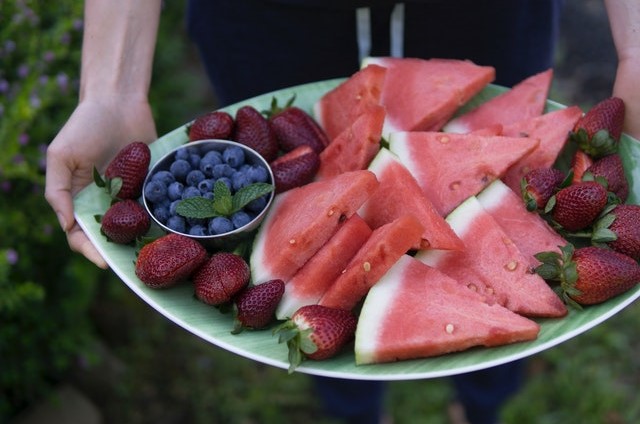A nutritious fruit that offers excellent health benefits and tingles taste buds. Here’s everything to know about this amazing fruit.
Aptly named as watermelons, these big balls of juice are over 90% water and that is what makes them immensely hydrating and cooling. They are a delight fruit for those wishing to lose weight. They are low in calories, fibre and have a mine of essential nutrients that our body needs for growth and functioning.
Basically, every slice of this amazing summer fruit comes packed with high nutritional value and health benefits. Apart from being eaten as a fruit, watermelons are used to make various dishes like smoothies, sorbets, shakes, jams, jellies, ice creams, cocktails and mocktails.
So, while you sit and think of the next watermelon recipe, we take you through it’s nutritional value and give you more reasons to relish every bite of this nutrition filled fruit.
WATERMELON NUTRITION CHART |
|
| Amount per 100 gms | |
| 30 Calories | |
| Carbohydrates | 7.50 gms |
| Proteins | 0.60 gms |
| Fats | 0.20 gms |
| Sugar | 6.00 gms |
| Vitamins | Vitamin A, C (Major) |
| Vitamin B2, B5, B6 (Minor) | |
| Minerals | Potassium, Mangnesium (Major) |
| Calcium, Iron, Zinc (Minor) | |
Why is Watermelon good for health?
Eating a watermelon has many health benefits like:
- Since watermelons have a high water content, they help in keeping the body hydrated, especially during summers when there’s a lot of heat and loss of fluids from body.
- The water and fibre content also aids in digestive health.
- Lycopene, the anti-oxidant that gives the fruit, it’s red colour fights against free radicals that can potentially cause Diabetes, Cancers and Heart Diseases.
- Beta Carotene in watermelons, gets converted into Vitamin A which helps in making Red and White Blood Cells. Thus, strengthening body’s immune system.
- Beta Carotene prevents skin damage by sun. That’s why many sun screen or anti tan products claim to contain beta carotene.
- Vitamin A and C help in maintaining eye sight and a good skin.
- Eating watermelon helps in fighting skin aging. Even it’s topical application improves skin texture.
- It naturally boosts libido without any side effects.
- Watermelon contains Citrulline, an amino acid that converts into Arginine in body, can help fight heart conditions, lower blood pressure and help in faster recovery after working out.
- It’s a great food for weight loss because it’s low on calories and high on water that gives you a full feeling. Also, studies have suggested that Arginine synthesized from Citrulline helps in fat and waist circumference reduction.
- Watermelons have a high Glycemic Index (72) but a low Glycemic Load (5). Hence, they can be safely consumed by those with diabetes.
- As is evident from the nutrition chart, watermelons contain good amounts of Potassium which regulates body fluids, nervous system and enhances bone health.
Side Effects of eating watermelon
- Too much watermelon consumption can lead to bloating, nausea & diarrhoea.
- Patients with diabetes must consume the whole fruit in limited quantities otherwise they might experience a spike in their blood sugar.
- Excessive consumption might cause an increase in potassium, citrulline intake thus, causing a decreased blood pressure, irregular heart beat etc.
- Some people might just be allergic to watermelons. So, if you are, please avoid eating the fruit.
Best Time to Eat
Watermelons can be had anytime from morning to evening. However, having them at noon time before lunch is the best. These should be avoided at night since they might cause indigestion and acidity.
Recipes
Watermelon Smoothie, Salad, Sorbet, Popsicles, Jams, Jellies, Ice Creams, Mocktails, Cocktails, Milkshakes.
References:
- www.rejuvenation-science.com
- www.defeatdiabetes.org
- www.pexels.com





